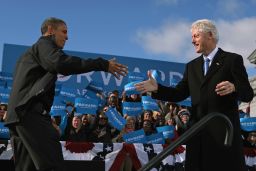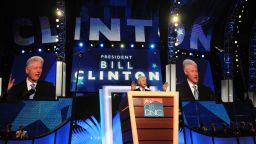Story highlights
Bill Clinton returns to the campaign trail on Monday
In 2008, his outbursts gave Obama's team easy openings to attack Hillary Clinton
After spending much of 2015 in the background of his wife’s campaign, Bill Clinton will make his first solo appearances on the trail Monday, stumping at a pair of events in early-voting New Hampshire.
The 69-year-old ex-president is the rare Democrat with the star power to outshine even Donald Trump. Every word out of his mouth is a potential headline, giving Clinton the power to reframe the campaign at any moment, for better or worse. A stray observation on Hillary Clinton’s opponents could set off a firestorm, just like the raucous crowds he is sure to attract will help gin up energy and excitement around her candidacy.
We’ve seen it happen before.
In 2008, his frustration over Hillary’s flailing campaign occasionally boiled over into angry or ill-conceived public attacks on then-Sen. Barack Obama. His outbursts gave Obama’s team easy openings to attack Hillary Clinton and contributed to a sense that her campaign was floundering.
Clinton recovered in 2012, offering full-throated support for Obama’s re-election in a memorable speech at the Democratic National Convention.
As he returns to the campaign trail, here’s a look at high and low moments of Bill Clinton, campaigner-in-chief.
The Bad:
New Hampshire, 2008: On the eve of the New Hampshire primary, a plainly frustrated Bill Clinton – reeling from Hillary Clinton’s loss in Iowa – launched a long and heated attack on Obama’s opposition to the Iraq War.
Clinton said the story of Obama’s long-held opposition to the war was bogus, that Obama and Hillary Clinton had the same position, really, and so “this whole thing is the biggest fairytale I’ve ever seen.”
Apart from being, at the best, misleading, Clinton’s comments set off Obama supporters, who didn’t appreciate hearing one of the bedrocks of his candidacy assailed in such blunt terms.
“I understand they’re frustrated right now,” Obama told the New York Times, referring to the Clintons. “I suspect that they’ll both try to get back on track in terms of the strategy for them to do better than they feel they’re doing right now.”
Hillary Clinton would win a comeback victory in the New Hampshire primary, but her campaign failed to pick up any significant momentum ahead of key contests in Nevada and South Carolina.
South Carolina, 2008: Bill Clinton’s worst moment on the trail came on January 26, 2008, as South Carolinians headed to the polls for their hotly contested primary. Obama and Hillary Clinton had split the first two contests, in Iowa and New Hampshire, but polls showed the Palmetto State leaning strongly toward the young Illinois senator.
Asked by a reporter, “What does it say about Barack Obama that it takes two of you to beat him?” Clinton, who had been up and down the trail in South Carolina, responded by calling the question “bait,” then saying, “Jesse Jackson won South Carolina in ’84 and ‘88. Jackson ran a good campaign. And Obama ran a good campaign here.”
Many observers believed Clinton meant to suggest that an Obama victory in the state should be dismissed because it was just another black candidate winning with the support of the African-American community. Jackson did it twice, while still failing to win the nomination.
“The only possible reason for invoking Jackson’s name was to telegraph the following message: Barack Obama is black, so if a lot of black people decide to vote for him – doubtless out of racial solidarity – it doesn’t really mean squat,” Washington Post columnist Eugene Robinson wrote in the aftermath.
Obama won by 28 points in South Carolina, and kept on winning, while Clinton was left trying to explain what he’d meant.
Before the Pennsylvania primary, 2008: As Obama took a firm grip on the nomination, Clinton was unnerved by the reaction to his comments in South Carolina.
“What happened there is a total myth and a mugging,” Clinton told CNN in March, before taking his allegations a step further in April.
“I think that they played the race card on me,” he said in an interview with radio station WHYY before the Pennsylvania primary. “We now know, from memos from the campaign, that they planned to do it all along.”
Asked about the former president’s allegations, Obama drove home the dagger.
“So former President Clinton dismissed my victory in South Carolina as being similar to Jesse Jackson and he is suggesting that somehow I had something to do with it?” he told reporters. “You better ask him what he meant by that. I have no idea what he meant. These were words that came out of his mouth. Not words that came out of mine.”
The Good
Democratic National Convention in Charlotte, 2012: The “explainer-in-chief” is born. With Obama’s re-election campaign mostly gliding along despite concerns about a slowly recovering economy, Clinton stepped to the plate to deliver a keynote address focused almost entirely on putting the president’s record into a more flattering context.
“Now, are we where we want to be today?” he asked “No. Is the president satisfied? Of course not. But are we better off than we were when he took office? The answer is yes.”
Turning to the Republicans, Clinton delivered his jabs with a smile.
“When Congressman Ryan looked into that TV camera and attacked President Obama’s Medicare savings as, quote, ‘the biggest, coldest power play,’ I didn’t know whether to laugh or cry,” he said.
The audience in Charlotte swooned and most commentators declared it a rousing success.
Clinton “cut through the predictable partisan spin by making a credible and compelling case for Barack Obama’s re-election – better, frankly, than the president has made himself to date,” said John Avlon, the CNN political commentator and Daily Beast editor-in-chief, after the speech. “If swing voters all listened to Wednesday night’s speech, I believe Barack Obama would win this election.”
With Clinton making more frequent appearances on the trail, Obama would go on to do just that, handily defeating challenger Mitt Romney in November.

Iowa, 2015: Bill Clinton at his best was on display as recently as October 24, when he warmed up a crowd of supporters in Iowa ahead of state Democrats’ annual Jefferson Jackson Dinner.
“When you elect a president you have got to say, ‘Who is the person I think is most likely to keep big, bad things from happening and to make more good things happen?’” Clinton said at an event in Des Moines. “I don’t think it is a terribly close question.”
This was the calm, reasoned – in tone and context – performance Bill Clinton had given on behalf of President Obama in 2012, in fits and starts during the 2008 nominating contest and toward the end of that general election, after the bruises of the primary fight had begun to heal.
During Hurricane Sandy, October 2012: On the morning of October 29, with the storm bearing down, the White House announced the president would return to Washington instead of stumping that day in Orlando. An event the next day in Wisconsin was also scrapped.
Less than a week out from Election Day, Obama was effectively absent from the campaign – stuck at home monitoring federal response and relief efforts.
Luckily for the president, he was able to put his fate in the hands of an on-point Bill Clinton, who deftly headlined two rallies, including one at the University of Central Florida.
“I have very strong feelings about this election,” Clinton told the mostly young crowd – one Obama needed to get out to the polls. “But this is not about the candidates. This about you and your future. It’s about two very different approaches and which one is more likely to build a 21st century of the American dream.”
Another potential crisis averted, again with Clinton’s aid, Obama would score a narrow victory in Florida days later.
The Ugly

Perhaps the most bizarre moment of the 2008 Clinton-Obama saga came near its end, during the Democratic National Convention in Denver. By then fully supportive of Obama’s bid, Clinton was even scheduled to campaign for wife’s former rival.
Then, apparently piqued over being asked to speak about national security during his address to the convention, Clinton went rogue.
“Suppose you’re a voter, and you’ve got candidate X and candidate Y,” he said at an offsite event in Denver. “Candidate X agrees with you on everything, but you don’t think that candidate can deliver on anything at all. Candidate Y you agree with on about half the issues, but he can deliver. Which candidate are you going to vote for?”
Then, after a pause, he added: “This has nothing to do with what’s going on now.”
Clinton’s remarks mirrored the argument used by his wife’s campaign throughout the primary: that Obama lacked the experience and tactical range, which Hillary herself had accrued over time, to get his legislative agenda through Congress. It was an odd moment, creating a swirl of controversy as the party prepared to crown its nominee.
Naturally, the McCain campaign pounced.
“By putting his country first, John McCain hasn’t always been the most popular public official,” a spokesman said in response to Clinton’s riff. “But it has always made him effective – so, John McCain is clearly candidate ‘Y’ in the equation.”
The episode would be mostly swept away by an eventual Obama landslide, but its memory only confirms that, for all his enviable talents, Bill Clinton is among the most powerful political wild cards.


